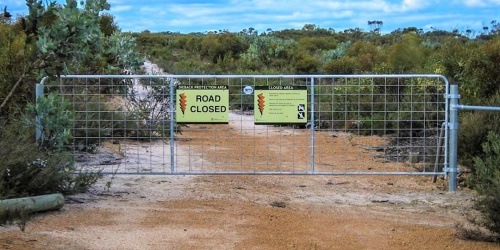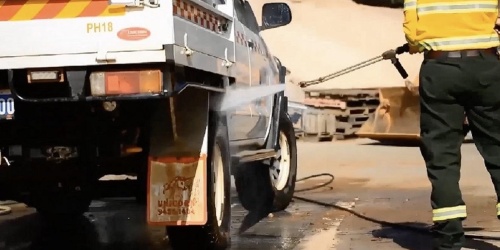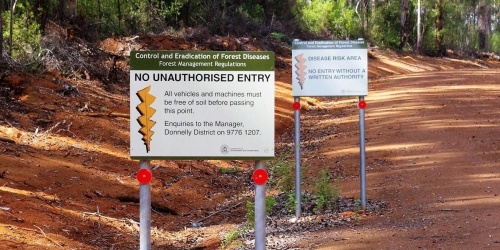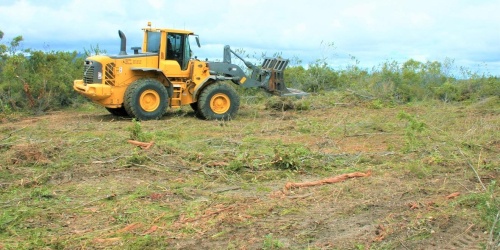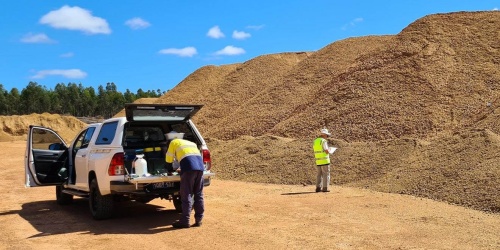
DBCA Interpreter recording Banksia death in heathland
To contain the spread of dieback it is essential to know where dieback occurs in the landscape. Dieback interpretation and mapping is integral to the department’s management of the disease and is undertaken by registered Phytophthora Dieback Interpreters (Interpreters).
What is a registered Interpreter?
The department has had a dieback mapping program since the early 1980s. It is a departmental requirement that dieback interpretation and mapping on lands managed by the department be undertaken by a registered interpreter.
Interpreters are specially trained to detect, diagnose and map the presence of Phytophthora, particularly P. cinnamomi, according to the processes, procedures and standards in the Phytophthora dieback interpreter’s manual for lands managed by the department FEM047 March 2015 (Interpreter’s manual).
The system for registering interpreters and monitoring standards of interpretation is administered by the Plant Diseases Program in the Ecosystem Health Branch.
What an Interpreter does
Interpreters assess areas of native vegetation for the signs and symptoms of dieback and undertake targeted sampling of soil and plant tissue to support their assessment. Samples are sent for analysis to a laboratory such as the department’s Vegetation Health Service.
Using the results of the assessment and sampling, the interpreter produces a dieback map and report. These documents underpin dieback management planning at the site. The map produced will show important information including the main dieback occurrence categories:
- Infested areas (pink shading) i.e. dieback present
- Uninfested areas (green shading) i.e. dieback not present
- Permanently uninterpretable areas (purple shading) i.e. unknown if dieback present
This information will enable a dieback management plan to be developed to mitigate the dieback risks to a site. Interpreters can also advise on the choice and deployment of dieback management tactics.

Example of dieback occurrence mapping. Image - Ian Moore/DBCA
How to engage an Interpreter
The register of interpreters includes departmental interpreters and private sector interpreters. To enquire about interpretation or obtain a quote, see the downloads section at the bottom of this page for contact information. DBCA staff should consult the relevant District Hygiene Coordinator (DHC) or interpreter for the area. The competencies of each Interpreter organisation are also provided in the contact document. You should ensure that the Interpreter organisation you engage meets your requirements. For example, if you require an interpreter to undertake interpretation in karri forest, they should have the 'Karri regrowth' supplementary competency.
Interpreter competencies
Interpreters are registered in the following competencies:
| Name | Competency description |
| Core (essential) | It is mandatory to be competent in core interpreting skills to become registered |
| Supplementary (optional) | A registered Interpreter may also be competent in one or more of the following supplementary skills |
| Areas of low interpretability | The skills to use low interpretability methods to identify and interpret areas of low interpretability |
| Dieback Impact | The skills to determine and categorise Phytophthora Dieback impacts in jarrah harvesting areas |
| Karri Regrowth | The skills to use karri thinnings interpretation methods to interpret and identify preliminary protectable areas |
How does someone become an Interpreter?
The primary training to become an Interpreter is done in the field under the supervision of an already registered and experienced interpreter in accordance with the standards described in the department’s Phytophthora Dieback Interpreter’s Manual (2015).
When the supervising interpreter feels that the trainee is ready, they will contact the department’s standards officers to schedule an evaluation of the trainee. The evaluation involves testing the trainee's ability to interpret disease, develop a dieback management map and write a report, in accordance with the department’s standards.
Fees for the evaluation of trainees and annual re-registration for registered Interpreters apply for non-departmental interpreters. Details of fees and charges for these services can be found in the downloads section below. Registered interpreters are additionally subject to standards checks on work that they do on lands managed by the department.
Contact us
If you have queries about the Dieback Interpretation program the Disease and Hygiene Standards Officers can be contacted by email at dhso@dbca.wa.gov.au
